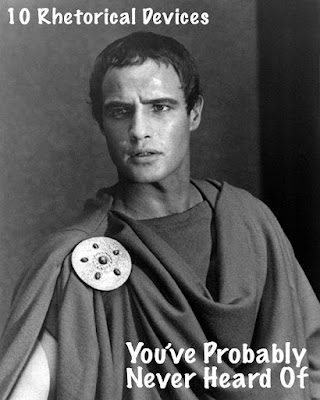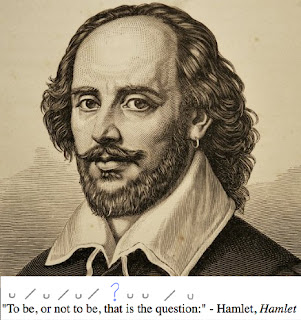10 Rhetorical Devices You've Probably Never Heard Of (with examples)
As everyone knows, Shakespeare was a master of rhetorical devices: consonance, metaphor, simile, anaphora...the list goes on and on. But Shakespeare went well beyond the basic ones. Have you heard of these rhetorical devices he used? All examples come from Antony's speech at Caesar's funeral (Julius Caesar, III.2.73-107).
1) Synecdoche
Definition: metaphorical substitution of a part for the whole
Citation: "Friends, Romans, Countrymen, lend me your ears" (line 73)
Explanation: When he says "your ears," Antony is using a part of an audience member (in this case, a body part: the ear) to refer to the audience as a whole.
2) Chiasmus
Definition: X-shaped inversion of a parallel construction
Citation: "If it were so, it was a grievous fault, / And grievously hath Caesar answer'd it." (lines 79-80)
Explanation: The word "grievous" appears at the end of the first line and the beginning of the next, and the word order of "it was a grievous fault" (subject, then verb) is inverted in the next line, "hath Caesar answer'd it" (verb, then subject).
3) Epimone
Definition: frequent repetition of a phrase, similar to a refrain
Citation: "But Brutus says he was ambitious, / And Brutus is an honorable man." (lines 86-87) and "Yet Brutus says he was ambitious, / And Brutus is an honorable man." (lines 93-94) and "Yet Brutus says he was ambitious: And sure he is an honorable man." (lines 98-99)
Explanation: Antony uses the same two lines in various points in his speech. Think of his speech as a song, and the epimone as the chorus.
4) Amphibologia
Definition: ambiguity
Citation: "He hath brought many captives home to Rome" (line 88)
Explanation: In this line, the pronoun "he" is ambiguous: does Antony refer to Brutus, or to Caesar?
5) Litotes
Definition: understatement, often using double negatives
Citation: "I speak not to disprove what Brutus spoke" (line 100)
Explanation: Antony's phrase "not to disprove" uses the double negative of "not" and "disprove" to cast doubt on Brutus' words. Antony claims he does not want to disprove Brutus's words, rather than saying that he wants to prove them. In this way, the understatement casts doubt on the truth of Brutus's words.
6) Epiplexis
Definition: rhetorical question, especially a rebuke
Citation: "Did this in Caesar seem ambitious?" (line 90)
Explanation: The answer to Antony's question is , of course, no. He does not expect the audience to answer aloud because the answer is evident in the question and the context.
7) Antistrophe
Definition: repetition of words at the end of successive clauses
Citation: "For Brutus is an honorable man; / So are they all, all honorable men." (lines 82-83)
Explanation: The repetition of "honorable man" is placed at the end of both lines (with a small variation, man --> men). Antistrophe's counterpart is anaphora: in anaphora, the repetition is at the beginning of successive clauses; in antistrophe, the repetition is at the end.
8) Aporia
Definition: feigned deliberative doubt over an issue
Citation: "Did this in Caesar seem ambitious?...Yet Brutus says he was ambitious." (lines 90-94)
Explanation: In fact, Antony's entire speech is an example of aporia. He feigns doubt over both Caesar's ambition and Brutus's honor to sway the crowd in his favor.
9) Epitrope
Definition: ironic concession to an opponent
Citation: "But Brutus says he was ambitious, / And Brutus is an honorable man." (lines 86-87) and "Yet Brutus says he was ambitious, / And Brutus is an honorable man." (lines 93-94) and "Yet Brutus says he was ambitious: And sure he is an honorable man." (lines 98-99)
Explanation: In these ironic phrases, Antony aims to undermine Brutus's honor. He claims his impression of Caesar was incorrect, in favor of Brutus's impression of Caesar (as ambitious).
10) Aposiopesis
Definition: interruption of speech, used to dramatize excess of emotion
Citation: "Bear with me, / My heart is in the coffin there with Caesar, / And I must pause till it come back to me." (lines 105-108)
Explanation: Antony feigns being so overcome with emotion at Caesar's death that he can no longer speak to the crowd. (In the 1953 movie, Marlon Brando uses this moment very skillfully to expose Antony's true intention to the viewers of the movie without showing the Romans.)



Comments
Post a Comment
All comments are moderated by the Green-Eyed Blogger to avoid spam. If you do not see your comment right away, do not worry; it is simply undergoing our routine moderation process.